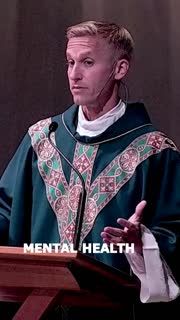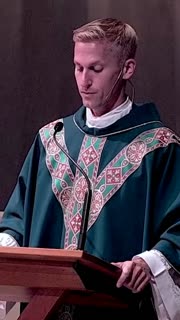Finding True Meaning in a Disconnected World
Devotional
Sermon Summary
Bible Study Guide
Sermon Clips
### Quotes for outreach
1. "Increasingly, you hear chatter and maybe see articles written oftentimes by psychologists and philosophers, whether they really by both atheists and theists discussing on what has been coined the meaning crisis, the meaning crisis. John Vervaeke, a cognitive psychologist and a philosopher, he's a professor at the University of Toronto. I don't believe he doesn't describe himself as a believer in God. He's got a popular YouTube channel. It's called Reawakening from the Meaning Crisis. And what he's devoted his life to is, one, it's understanding it, like how have we gotten here in a meaning crisis?" [01:04] (60 seconds)
2. "So how is it that you find your meaning and purpose? With that, I want to go to our second reading, St. Paul's letter to the Ephesians, which will be in now for the really the rest of the summer. And to be honest with you, I was hesitant to even to go here and spend time with what we're going to spend time on right now. Because I just thought, well, it's just too simple. And the Lord very clearly said, no, no, Mark. There's a meaning crisis." [05:04] (37 seconds)
3. "The world says, you create your meaning. You create your purpose. A phrase that you can. You know, we continue to hear. I would say we've heard more so in the last 10 years, five years, increasingly the last number of couple years is the way that you find your purpose is that you look within. You discover it. That's not the Christian understanding. And it will eventually lead to a meaning crisis." [08:04] (29 seconds)
4. "So let the scriptures, let God inform you on what your meaning and purpose in life is. And maybe to sum it up, maybe another way, even a deeper way is to say the purpose in your life is to let God love you. And learn to love him back. It's to be holy. To worship him and to praise him." [09:38] (27 seconds)
5. "Unless the infinite transcendent God becomes our reference point. We are missing out on the meaning and purpose of our life. And one cannot live a flourishing life. What's your meaning in life? What's your purpose in life? What's your reference point? Like truly, what's your reference point? Is it him? Like really him? That I live that way. I think that way. I operate that way." [12:09] (41 seconds)
### Quotes for members
1. "And just because they're in the pews in a church or up here in the sanctuary, doesn't mean that there's no one struggling with meaning and purpose. Because what I'm increasingly aware of is that it also doesn't take much for one to slip into despair. It doesn't take much for one to fall into hopelessness. And then you're asking, well, what's the meaning and purpose of it all?" [06:04] (33 seconds)
2. "Daughter. Son. Chosen. Redeemed. Beloved. Given to me. I didn't earn that. I don't deserve that. I didn't discover that. Like, I didn't do a search within to try to find that. It was given to me as a fundamental identity that needs to be my reference point." [07:13] (41 seconds)
3. "You know, I was thinking this and I was thinking of the second reading of Paul's, this section, verse three to verse 14. And I was thinking of the wisdom that the church has to make that reading, the second reading that we heard, I was just talking about. She makes that reading mandatory for priests to read every week, once a week. And anytime the church makes something mandatory, it's because it's for our own benefit." [09:38] (31 seconds)
4. "And in the course of, you know, the time on the phone ministering to him and planning for the funeral at the end of the conversation, he just simply said at the end, he said, we're blessed to have you here, Father Mark. And it just, he was saying that it just pierced me. I was like, I was fighting. I was fighting back tears there as I was hanging up on the hanging up the phone with him. And it was if you're chosen to be here." [12:09] (30 seconds)
5. "There is a meaning crisis today. And it's causing us to be sick. A lot of times that's results in either becoming brutal ourselves. And becoming evil and hateful. And we saw that again yesterday. Or in losing hope. And crawling up in a ball. But he sent them out. And he sends you and me out. So people might know that they don't have to create and find their meaning and purpose in life. But rather they can receive it. That their life matters. That they've been chosen from the foundations of the world." [13:04] (47 seconds)
Ask a question about this sermon
1. "Increasingly, you hear chatter and maybe see articles written oftentimes by psychologists and philosophers, whether they really by both atheists and theists discussing on what has been coined the meaning crisis, the meaning crisis. John Vervaeke, a cognitive psychologist and a philosopher, he's a professor at the University of Toronto. I don't believe he doesn't describe himself as a believer in God. He's got a popular YouTube channel. It's called Reawakening from the Meaning Crisis. And what he's devoted his life to is, one, it's understanding it, like how have we gotten here in a meaning crisis?" [01:04] (60 seconds)
2. "So how is it that you find your meaning and purpose? With that, I want to go to our second reading, St. Paul's letter to the Ephesians, which will be in now for the really the rest of the summer. And to be honest with you, I was hesitant to even to go here and spend time with what we're going to spend time on right now. Because I just thought, well, it's just too simple. And the Lord very clearly said, no, no, Mark. There's a meaning crisis." [05:04] (37 seconds)
3. "The world says, you create your meaning. You create your purpose. A phrase that you can. You know, we continue to hear. I would say we've heard more so in the last 10 years, five years, increasingly the last number of couple years is the way that you find your purpose is that you look within. You discover it. That's not the Christian understanding. And it will eventually lead to a meaning crisis." [08:04] (29 seconds)
4. "So let the scriptures, let God inform you on what your meaning and purpose in life is. And maybe to sum it up, maybe another way, even a deeper way is to say the purpose in your life is to let God love you. And learn to love him back. It's to be holy. To worship him and to praise him." [09:38] (27 seconds)
5. "Unless the infinite transcendent God becomes our reference point. We are missing out on the meaning and purpose of our life. And one cannot live a flourishing life. What's your meaning in life? What's your purpose in life? What's your reference point? Like truly, what's your reference point? Is it him? Like really him? That I live that way. I think that way. I operate that way." [12:09] (41 seconds)
### Quotes for members
1. "And just because they're in the pews in a church or up here in the sanctuary, doesn't mean that there's no one struggling with meaning and purpose. Because what I'm increasingly aware of is that it also doesn't take much for one to slip into despair. It doesn't take much for one to fall into hopelessness. And then you're asking, well, what's the meaning and purpose of it all?" [06:04] (33 seconds)
2. "Daughter. Son. Chosen. Redeemed. Beloved. Given to me. I didn't earn that. I don't deserve that. I didn't discover that. Like, I didn't do a search within to try to find that. It was given to me as a fundamental identity that needs to be my reference point." [07:13] (41 seconds)
3. "You know, I was thinking this and I was thinking of the second reading of Paul's, this section, verse three to verse 14. And I was thinking of the wisdom that the church has to make that reading, the second reading that we heard, I was just talking about. She makes that reading mandatory for priests to read every week, once a week. And anytime the church makes something mandatory, it's because it's for our own benefit." [09:38] (31 seconds)
4. "And in the course of, you know, the time on the phone ministering to him and planning for the funeral at the end of the conversation, he just simply said at the end, he said, we're blessed to have you here, Father Mark. And it just, he was saying that it just pierced me. I was like, I was fighting. I was fighting back tears there as I was hanging up on the hanging up the phone with him. And it was if you're chosen to be here." [12:09] (30 seconds)
5. "There is a meaning crisis today. And it's causing us to be sick. A lot of times that's results in either becoming brutal ourselves. And becoming evil and hateful. And we saw that again yesterday. Or in losing hope. And crawling up in a ball. But he sent them out. And he sends you and me out. So people might know that they don't have to create and find their meaning and purpose in life. But rather they can receive it. That their life matters. That they've been chosen from the foundations of the world." [13:04] (47 seconds)










